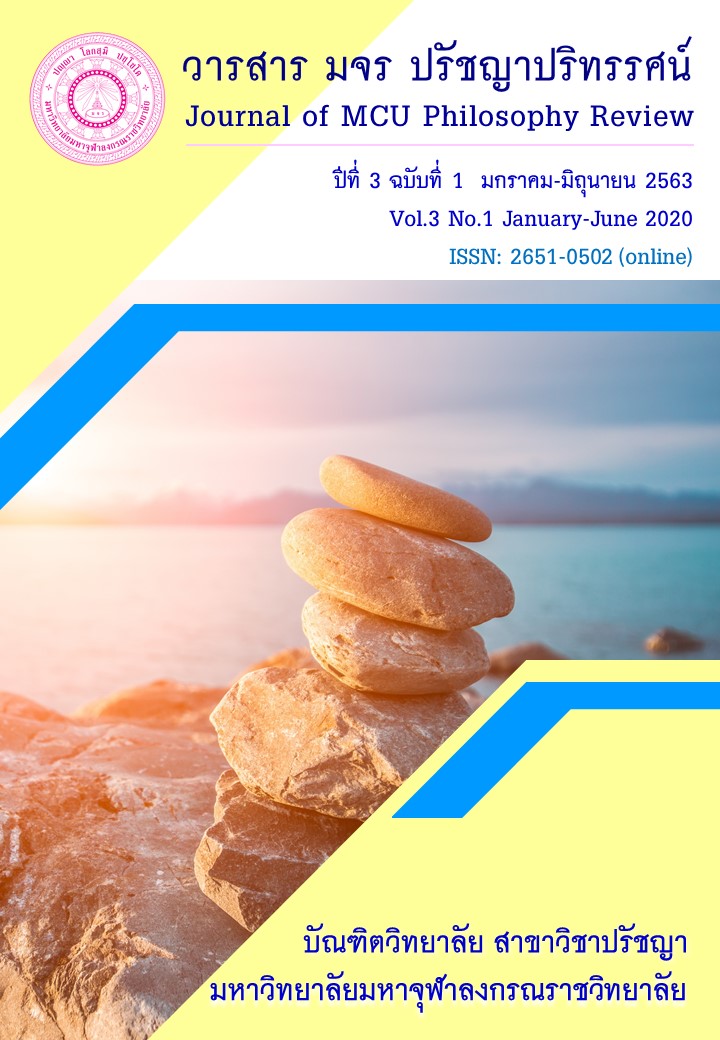A Critical Study of the Nature of Power in Taoism
Main Article Content
Abstract
This article entitled to study the nature of power in Taoism and to critically study the power and ruling in Taoism. This is a qualitative research done by studying academic documents. In the research, it was found that in the study of the nature of power in Taoism, it was found that the most powerful thing is Taoism because Taoism is by nature the origin of all things relatively arising out of Yin and Yang; such power of Taoism conditionally exists, it always changes into two aspects: 1) it changes in the form of circulating thing and 2) it changes in the opposite way. Under the mentioned law of Taoism, a human being who is born out of Taoism naturally comes to be of good and bad characteristics, if a human being behaves in the opposite way of Taoism whose nature is overwhelmed by selfishness and greed, he may create harmful actions. As far as the analysis of the power and ruling in Taoism is concerned, it was found that the ruler who moderately rules the country through the principle of non-action (Wu-Wei) can be regarded as the good ruler; the aforesaid principle basically means non-action, disturbing people in exaggerating ways; such a ruler should realize that the true power belongs to general people who are under his ruling because they can take their power back from the ruler. Moreover, in ruling, the ruler should avoid initiating war because it is dangerous giving rise to a great deal of damage in viewpoint of Taoism. When it comes to educational management, the ruler should inculcate people with more knowledge based on Taoism than worldly knowledge because such worldly knowledge is prone to bring about exploitation over one another.
Article Details
บทความที่ได้รับการตีพิมพ์เป็นลิขสิทธิ์ของวารสาร มจร ปรัชญาปริทรรศน์
ข้อความในบทความที่ได้รับการตีพิมพ์ในวารสาร ถือเป็นความรับผิดชอบของผู้เขียนบทความ และข้อคิดเห็นนั้นไม่ถือว่าเป็นทัศนะและความรับผิดชอบของกองบรรณาธิการวารสาร มจร ปรัชญาปริทรรศน์
References
ฉัตรสุมาลย์ กบิลสิงห์ ษัฏเสน. (2545). คัมภีร์เต๋าฉบับสมบูรณ์พร้อมอรรถกถา. พิมพ์ครั้งที่ 4. กรุงเทพมหานคร : สำนักพิมพ์ศยาม.
นิพาดา วิริยะวงศ์พานิช. (2559). แก่นขงจื๊อ ความหมายแห่งชีวิตแท้จริงและปัญญาที่ยิ่งใหญ่. พิมพ์ครั้งที่ 2. กรุงเทพมหานคร : แสงดาว.
ปกรณ์ ลิมปนุสรณ์. (2553). คัมภีร์เต๋าของเหลาจื่อ. พิมพ์ครั้งที่ 2. กรุงเทพมหานคร : สร้างสรรค์บุ๊คส์ จำกัด.
ฟื้น ดอกบัว. (2549). ปวงปรัชญาจีน. พิมพ์ครั้งที่ 3. กรุงเทพมหานคร : สำนักพิมพ์ศยาม.
สมภาร พรมทา. (2546). พุทธศาสนานิกายเซน : การศึกษาเชิงวิเคราะห์. พิมพ์ครั้งที่ 3.กรุงเทพมหานคร : โรงพิมพ์แห่งจุฬาลงกรณ์มหาวิทยาลัย.
สุวรรณา สถาอานันท์.(2548). กระแสธารปรัชญาจีน: ข้อโต้แย้งเรื่องธรรมชาติ อำนาจ จารีต. พิมพ์ครั้งที่ 3. กรุงเทพมหานคร : โรงพิมพ์แห่งจุฬาลงกรณ์มหาวิทยาลัย.


